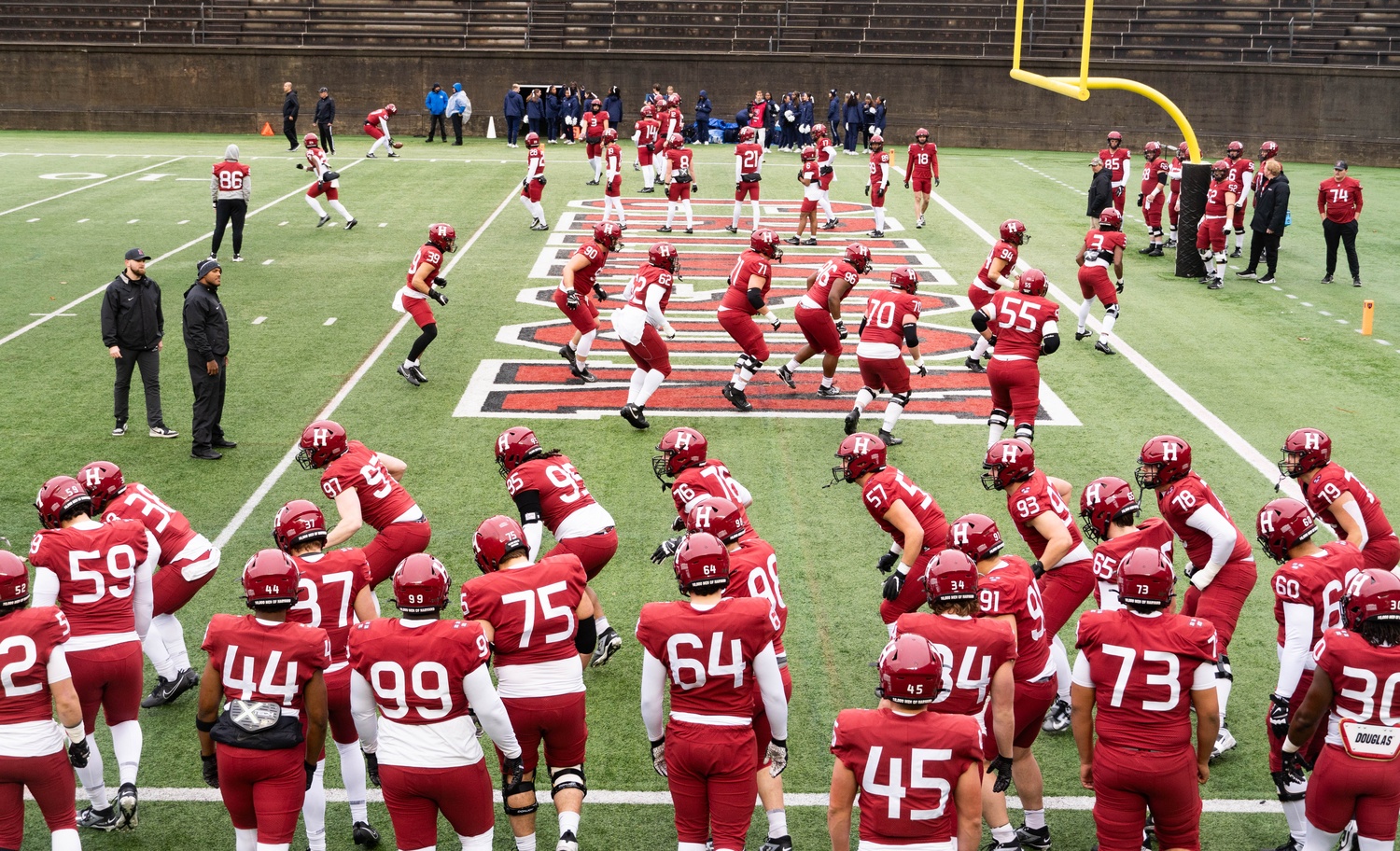
News
Harvard Grad Union Agrees To Bargain Without Ground Rules

News
Harvard Chabad Petitions to Change City Zoning Laws

News
Kestenbaum Files Opposition to Harvard’s Request for Documents

News
Harvard Agrees to a 1-Year $6 Million PILOT Agreement With the City of Cambridge

News
HUA Election Will Feature No Referenda or Survey Questions
Ivy League Football Champion To Play in 2025 NCAA Playoffs

Updated December 18, 2024, at 5:07 p.m.
The Ivy League football champion will play in the Division I Football Championship Subdivision playoffs starting next season, according to a Wednesday announcement from the Ivy League Council of Presidents.
The decision allows the Ivy League’s eight football teams to compete for one automatic bid to college football’s second-highest level postseason, reversing a 1945 ban that ended every Ivy League season after only ten games. The Ivy League champion will enter a postseason tournament against FCS teams including North Dakota State and Montana State.
Wednesday’s announcement is the result of a year-long process initiated by the Ivy League’s Student-Athlete Advisory Committee. Harvard Athletic Director Erin McDermott confirmed in an interview last month that the Ivy League was considering the proposal.
“We now look ahead to a new chapter of success and to further enhancing the student-athlete experience with our participation in the NCAA FCS playoffs,” Ivy League Executive Director Robin Harris wrote in the release.
Harvard Football has shared the Ivy League title for the last two seasons, most recently sharing the trophy with Columbia and Dartmouth.
But under the new regulation, only one Ivy League team will advance into the postseason. According to the press release, officials will develop a contingency system for selecting one postseason qualifier from a group of co-champions ahead of the 2025 season.
Harvard Head Football Coach Andrew Aurich, who has been an advocate for Ivy League competition in the postseason, wrote in the release that he is hopeful for Harvard’s postseason future.
“Ivy League football is the most competitive it’s ever been and I’m excited for us to make some noise in the playoffs for years to come,” Aurich wrote.
Sam K. Bjarnason ’25, a member of the Ivy League Student-Athlete Advisory Committee that made the proposal, explained in a November interview with The Crimson that proposals for league-wide changes go through three phases — they begin with athletic directors, move on to a policy committee, and finally go through university presidents for ultimate approval.
In an interview with The Crimson, Aurich said Harvard’s football players had wanted to play in the playoffs for a while. He added that Wednesday’s change came from a recent push by all student-athletes — not just those on the football team — advocating for football to join other Ivy League teams in getting the chance for postseason competition.
Tessa A. Shahbo ’26, the co-president of Harvard’s Student-Athlete Advisory Committee, said members of the committee were unanimously in support of giving the football team the chance to compete in the postseason.
“All of us were pretty shocked that it needed to even really be a discussion,” Shahbo said.
“Why wouldn’t we give them this opportunity?” she added.
Former Harvard Football captain Shane M. McLaughlin ’25, who led the team to its shared Ivy League victory this past season, said a “handful of recruits” are hungry to compete for the national title — an opportunity they would not have had at Harvard in the past. Wednesday’s decision, he said, could attract a strong group of athletes to play for the Crimson.
“We already are competitive to the point where we could compete for it, but just continually getting good recruits can have a tremendous impact on the program,” McLaughlin said.
Aurich said he believes the decision will increase the national prestige of Ivy League athletics at a moment when Harvard and other schools have fielded particularly competitive football teams.
“It’s an exciting time to be part of the Ivy League,” he said.
—Staff writer Elyse C. Goncalves can be reached at elyse.goncalves@thecrimson.com. Follow her on X @e1ysegoncalves.
—Staff writer Akshaya Ravi can be reached at akshaya.ravi@thecrimson.com. Follow her on X @akshayaravi22.
Want to keep up with breaking news? Subscribe to our email newsletter.
Most Read
- Harvard Dismisses Leaders of Center for Middle Eastern Studies
- Harvard Agrees to a 1-Year $6 Million PILOT Agreement With the City of Cambridge
- FAS Dean Asks Center Directors To Show Compliance With Viewpoint Diversity Guidance
- 2 Years After Affirmative Action Ruling, Harvard Admits Class of 2029 Without Releasing Data
- Adams House Resident Dean Issues Warning to Student Who Booked Room for AFRO Event
From Our Advertisers

Over 300+ courses at prestigious colleges and universities in the US and UK are at your disposal.

With innovative financial tools combined with financial education, Collegiate empowers students to take control of their finances and build confidence in their money management skills.

Serve as a proctor for Harvard Summer School (HSS) students, either in the Secondary School Program (SSP), General Program (GP), or Pre-College Program.

With an increasingly competitive Law School admissions process, it's important to understand what makes an applicant stand out.

Welcome to your one-stop gifting destination for men and women—it's like your neighborhood holiday shop, but way cooler.

Admit Expert is a premium MBA admissions consulting company, helping candidates secure admission to top B-schools across the globe with significant scholarships.
